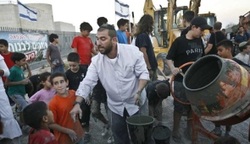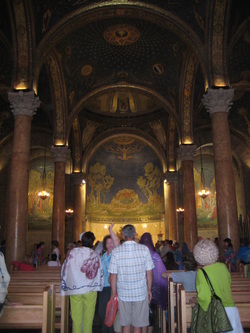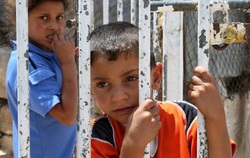Obama spoke about his faith at a backyard campaign talk recently. I scrolled down to some of the comments left by readers. One individual's comment caught my attention: " I also attended a church every sunday in a small town on the coast of Texas. It was a baptist church, and frankly, I didn't agree with everything the preacher said. It was the late 60's and early 70's, but even in that era there was no excuse of the pastor's and much of the congregation's racism, sexism, classism, homophobia and general narrow mindedness, much less their blatent misuse of scripture for political and social advantage. I left that church much like Obama did his. In my case I became an Atheist, and for that I will be forever greatful to that little hateful church in Texas City." I was at first unsurprised by his comment. It simply reflects the general (secularist) disenchantment with pastors and the idea of Sunday services. But then something struck me. What does faith really mean? I think we often ascribe too much responsibility to others for our own attitudes on a particular religion, instead of reflecting back on ourselves and how much effort we actually put into knowing the true religion. It's as though the church, the pastor, the other churchgoers - anybody other than yourself - are responsible for your own belief. The essence of faith resides in an individual. Faith is not something that could be helped or hindered by others - not institutions, not individuals, nobody. It is up to you and only you. I can speak to this because those were the same sentiments I had for the past couple of years. I was disenchanted with the churches and fellowships I was attending. I looked around at the other Christians and thought, "What's the use of religion if I'm just going to turn into one of them?" I started seeing Christianity not through the word of God, but by others' actions. But these attitudes stemmed from own blindness toward my own imperfections and irresponsibility. My negative ideas toward Christianity were simply an excuse to not put the work and effort - reading the whole Bible, for example - into really knowing the faith. I should not blame others - only myself - for my own ideas of a particular religion. In sum, individuals should stop blaming churches and others for their own conceptions of a particular religion, and start discovering what religion means for them personally. Start by reading the Bible, the Torah, or the Quran, and see for yourself what those sacred texts really mean to you.
Maybe next time I get to ride in her taxi! Having more women on the road may not be a bad thing, considering the current predominance of reckless (male) drivers. I tend to think that women exercise more reason, patience, responsibility, and care when they are driving. But then again, that's up for debate.
I was talking with a friend of mine a couple of days ago, and I couldn't help but feel guilt throughout the conversation.
I made a casual remark about how uneventful and quiet (read: dull Friday scene for a college student) Ithaca was compared to cities like Vancouver and New York, but that's not to say I don't like Ithaca for what it is. My friend retorted by saying how Cornellians need to see others in the world - in presumably poorer countries - so they can "value what they got in hand."
His comment truly indicted me for my lack of empathy and blatant insensitivity to others' situation. We are often so caught up with our own lives that we fail to see the needs and wants of those around us - whether they are your next door neighbor or a friend across the Atlantic. I did not realize that I was imposing my own values of what is "good", "boring", "fun", etc. on others when I made that off-handed remark.
But maybe these remarks are inevitable, given our different situations. The times when we fail to recognize how good we've got it and complain to others how "bad" our situation, we are using our own frame of reference to judge our environment because that is all we have to work with. Hence, can we really use others' frame of reference when in reality, we have never experienced their wants, their needs, and their worries?
I am also caught in a dilemma: If we are making these judgments based on our relative situations, then what is really "good" and "bad"? Can we ever find these absolute values if in reality, all the values that we hold onto are constructed by our lived realities?
I was given a chance to have a glimpse of an alternative reality - when I was in their situation, living side-by-side with them. I think that is when one starts to recognize that there are different frames of reference - different social contexts, historical truths, and religious beliefs - through which one can view the world.
But this brings me back to my original point: if we are reminded of the dire situations in less-fortunate places, would we be compelled to act to bring them out of their relative misery, or would we still be content to sit around, wait till someone fixes the situation for them, and at the same time complain about our own relative unhappiness?
I, for one, am first to admit that I have fallen in the latter group. How do we get out of this rut?
One possible answer: Escape the fantasy world that is Cornell and start staking it out in the world.
I admire the brave individuals who have chosen to follow their conscience and not government directives. But do these instances of non-violent direct action actually pressure the Israeli government in retracting its obstacles - mainly the settlements in the West Bank - so that peace can be one step closer to being a reality in the region? After all, these small acts of protest do nothing to deter the significant voices within Israel (read: settlers, Lieberman and politicians in general) that espouse the idea that the land west of the Jordan river belongs only to the Jewish people. There is no reasoning with these individuals; they will simply continue on their trajectory of demolishing every single piece of Arab artifact in the region in order to justify their own historical/biblical narrative on their God-given land. So this begs the question: Is the (presumably) silent majority within Israel dead? Where are the ones who are supposed to be the voice of reason amidst the demagogues and fiercely-religious ideologues? It is time for the silent majority within Israel to make the Israeli government accountable for all its illegal activities beyond the Green Line. That is, if there is a silent majority left in Israel at all.
As I was listening to music on my ipod today, and I couldn't help but be reminded of the sunflower fields at Kibbutz Mizra and the narrow streets of Dokki. I think there is something about music, and the time and place you play it, that invokes feelings inside of you. I miss you, Egypt and Israel.
Hubris often gets the better of us. Why are we always stuck in an overly-optimistic mindset, that the worst scenario would always escape us? Despite the optimistic report on BP's ability to finally cap the well, we must not forget the irreparable damages that have befallen the communities along the Gulf. If our public policies continue to be grounded in the unsubstantiated belief that humans are capable of mastering market forces, natural phenomenon, and the like, another disaster like the financial crisis or the Gulf spill is likely to happen all over again. We need to acknowledge our own weaknesses and act with the necessary precautions that are not conditional on the profit-driven book-keeping.
Despite having not slept for the past 48 hours (thank goodness for coffee), I was able to find joy in the little things that happened today:
1) A spontaneous Skype call with Michelle about life. I missed you so much! <3
2) Another spontaneous Skype conference (!) with mom, Peter, and Annie :)
3) A sunny day instead of the usual crappy Ithaca weather
4) Sam Tsui got a new video up! (okay I am a bit obsessed with him)
5) And last but not least, 26 days until SAKE BOMB WEEK begins!
Of course, you all are invited to my week of debauchery that begins on October 16th! I will send out details soon :)
Conventional thought is that people identify a place by its history. That association between history and place is constructed through social processes, and is ingrained into the collective consciousness. People seek their identity in places by super-imposing their interpretations and narratives on a piece of land or structure. Rem Koolhaas seems to think that history is no longer relevant in conceptualizing the built environment, because history only functions to inflate already overly-occupied and exhausted city centers. In Koolhaas' own words: " To the extent that history finds its deposit in architecture, present human quantities will inevitably burst and deplete previous substance. Identity conceived as this form of sharing the past is a losing proposition: not only is there - in a stable model of continuous population expansion - proportionally less and less to share, but history also has an invidious half-life - as it is more abused, it becomes less significant - to the point where its diminishing handouts become insulting. This thinning is exacerbated by the constantly increasing mass of tourists, an avalanche that, in a perpetual quest for 'character,' grinds successful identities down to meaningless dust." To keep city centers alive is the "thinning" out of the place's history, and this is particular poignant in Jerusalem. The Old City, as the center of all that defines Jerusalem - politics, religion, history, culture, ethnic identity - is over-saturated with benign and non-denominational religious icons, gaudy souvenirs that call for the pious and atheist alike, touristic re-packaging of religious rituals (or what's left of it), holy sites desacralized under the weight of tourists, ostentatious proclamation of a place's importance through mammoth structures...the list goes on. There is also a "hyper-local"/"hyper-global" element to Jerusalem. The "hyper-local" is felt in the religious going-abouts of the Orthodox Jews, the hawking of the store keepers on Jerusalem's treasures, and the centuries-old relics that are fervently guarded by nuns and monks. The "hyper-global" is felt in the amalgamation of global services that cater to the transient religious pilgrim, the universally-understood signage that direct tourists - regardless of nationality - to common points of interest, and the collection of international institutions that demand a piece of Jerusalem's history. Will Jerusalem someday implode under the immensity of its manifold tangential contradictions?
Political institutions try to shape people's beliefs and ideologies. This is scarily evident in Israel's case. I came across a peculiar ad with a camel when I was browsing through Haaretz' website. Being the curious person, I clicked on the ad and found myself at the website of Israel's Ministry of Public Diplomacy and Diaspora Affairs. The Ministry's purpose boils down to this: re-educating Israelis in using state-mediated responses for tricky questions (those that concern Israel and Palestine) that the every-day Jewish citizen may receive from people abroad. Basically, the Ministry untangles the whole Israeli-Palestinian conflict for the average "misinformed" Israeli (with the assumption that the Israeli is Jewish) by stating that: 1) The land that is West of the Jordan River belongs to Jews because of historical ("biblical") rights. 2) That Arabs basically do not have any rights to the land West of the Jordan River. A strong whiff of self-righteousness permeates the website. I was left feeling completely disgusted when I read through what is essentially government propaganda. If these dangerously-ethnocentric ideologies and beliefs are what the Israeli government wants its own citizens to adhere to, then how could you even start negotiating with the Palestinians? Which makes me think that the current round of peace talks is just another game of charades. Even more motivation to work on my thesis now...
I often forget who/what the numbers in World Bank and UNDP reports refer to. It takes constant reminders that behind these numbers are faces that describe a developing country.
Today, I had a great talk with a friend about the humanitarian crisis in the Middle East. The true realities of these individuals - from a first-person account - are often not reflected in the analytical and technical ways through which we, from the heights of our Ivory Tower, study issues of (under)development, conflict, and politics, to name a few.
We are privileged in looking, critiquing, analyzing, and judging the world from a place of comfort, security, and ease. From our Ivory Tower, we can never truly understand the pain, the suffering, the urgency, and the hopelessness these individuals on the other side of the world are experiencing every day.
Would this kind of setting - one of comfort and detachment - allow us to approach crucial issues such as developmental aid and foreign military policies in a constructive and effective manner?
That is for you to decide. But for me, I'm going back to the place where I can hear people's personal narratives of their daily struggles.
|







 RSS Feed
RSS Feed